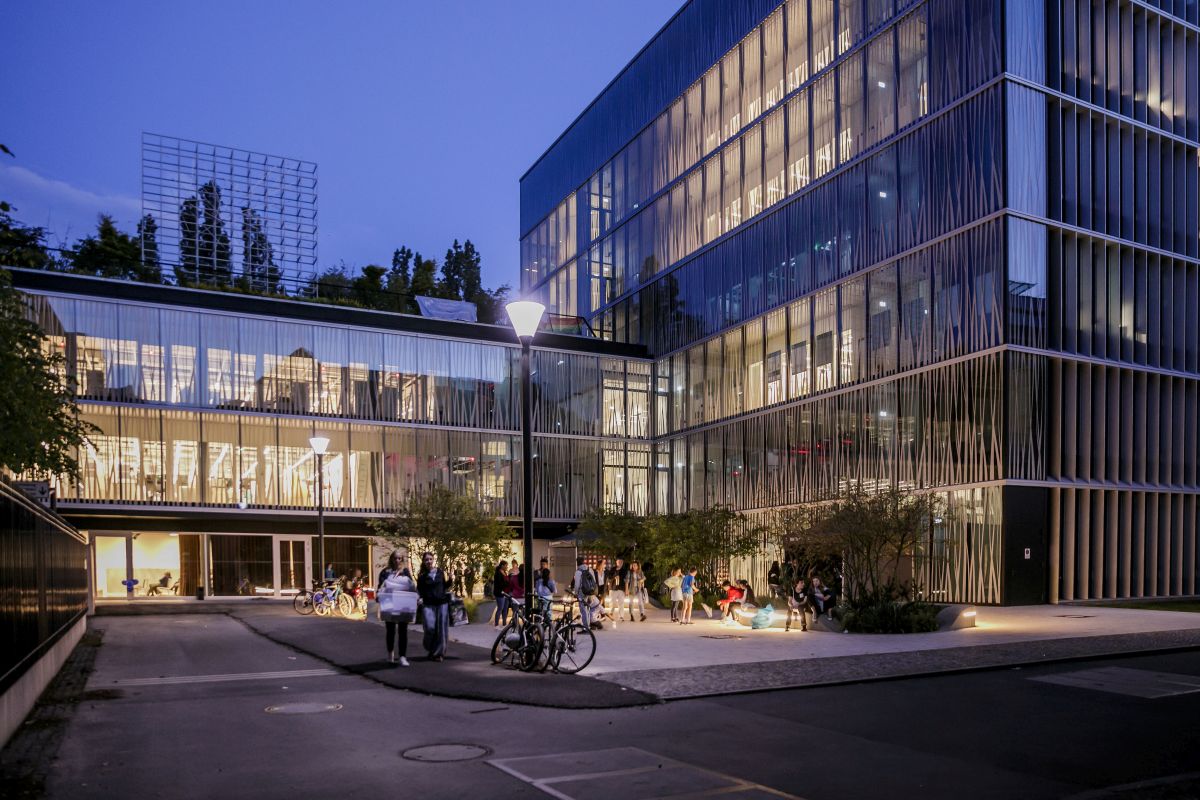
News
The Max Delbrück Center celebrates 15 years of MDC‑BIMSB
05.09.2023 / Internationally renowned for pioneering achievements and geared to inter-institutional cooperation: 22 research groups at the Berlin Institute for Medical Systems Biology in the Max Delbrück Center (MDC-BIMSB) explore how genes regulate life. It is now celebrating its 15th birthday.

Since 2008, the Berlin Institute for Medical Systems Biology has expanded the profile of the Max Delbrück Center. In the last 15 years, it has become a beacon: with collaborations throughout the world, pioneering technological achievements, and pathbreaking outcomes that trace the changes in individual cells throughout life and thus open up new perspectives in medicine, together with a new building in the heart of Berlin that promotes open, cross-disciplinary and inter-institutional cooperation. What has been created is considered to be in the vanguard of medical systems biology worldwide – and a launching pad for outstanding junior researchers.
The Max Delbrück Center is celebrating this anniversary on September 5th, 2023, together with some 150 invited guests from academia, politics and society. This will be followed on September 6th and 7th by the Berlin Summer Meeting which will feature distinguished speakers, as well as contributions by outstanding alumni.
Foresight regarding the potential of systems biology
“Today, systems biology is considered an essential pillar of precision medicine – you just need to think of cancer. But 15 years ago, many people were still skeptical whether data science and quantitative approaches could yield new insights. Research was supposed to be hypothesis-driven,” says Professor Maike Sander, Scientific Director of the Max Delbrück Center. “The founders of MDC-BIMSB – especially Nikolaus Rajewsky – were willing to challenge existing dogma. They had foresight, recognized the potential. They had a clear vision and developed the right approach to build an excellent program: from the bottom up. The institute became an internationally renowned pioneer in systems medicine which enhanced the visibility of the Max Delbrück Center.”
At the beginning, the Federal Ministry of Education and Research (BMBF) and the Berlin Senate funded the institute as a pilot project under the “Cutting-edge research and innovation in the New Länder” program; just five years later, the federal government made the financing permanent. A building of its own followed in 2019 on the north campus of Humboldt-Universität zu Berlin, very close to Charité – Universitätsmedizin Berlin and customized to the demands of systems biology. In total, the federal government has provided approximately 250 million euros to this day. The state of Berlin has supported these efforts.
Currently, 22 internationally recruited research groups are active at MDC-BIMSB, creating the basis for the personalized medicine of the future. “Every day, people from completely different backgrounds come together here to innovate and create something new. This concept has been very successful,” reflects Professor Nikolaus Rajewsky, the visionary behind the conception and establishment of the MDC-BIMSB. “The future lies in fostering cooperation between institutions. We want to integrate data science, clinical research, basic research, and venture capital into a unified ecosystem – both within Berlin and on a larger scale together with our international partners. Through this approach, we can enhance our international competitiveness, utilize our resources responsibly, and drive the integration of artificial intelligence into health research.”
The research approach: how genes regulate life
In the course of its life, a cell repeatedly draws on instructions contained in its genome. It reads them like a book and discovers how it should respond to external influences. Using genome and single-cell biology methods, researchers can observe what they are up to.
For example, scientists take samples of tissue from patients or patient-specific organoids and analyze which cell is in the process of reading which genes, translating them into proteins. This results in huge volumes of data that are evaluated using of artificial intelligence and machine learning. Moreover, the researchers can reconstruct where the cells were located in the tissue – and how the respective cellular neighborhood has influenced them. The origami of the DNA strand within the cell’s nucleus is also crucial to life. Thanks to folding, genes that seem to be far apart in the linear sequence can be neighbors and influence each other.
Bridges in Berlin and to Lisbon
By precisely investigating the various levels of gene regulation, the scientists want to understand when and why a cell changes from their normal development in the direction of disease and how they can be guided back to a healthy state as soon as possible. When just a few cells in our bodies are affected, we neither experience symptoms nor consequential damage. If a diagnosis can be made at this stage and the disease halted in its tracks, patients could be spared a great deal of suffering. In order to transfer this precision medicine to clinical practice at the earliest possible stage, researchers and clinicians from ten leading Berlin institutions, including the systems biologists at the Max Delbrück Center, are working together to form the Einstein Center for Early Disease Interception. This is also the prelude to the Berlin Cell Hospital.
Researchers at the Max Delbrück Center also build international bridges. In Lisbon, for instance, an institute is currently being established based on the MDC-BIMSB model: the NOVA Institute for Medical Systems Biology (NIMSB). NOVA University and the Max Delbrück Center are jointly establishing NIMSB as a Center of Excellence. To this end, the European Commission has granted funding of 15 million euros; NOVA University has secured an additional 20 million euros from Portugal. The project was inspired by the LifeTime-Initiative which was also coordinated by the Max Delbrück Center. “We are thrilled about this strategic partnership – and proud to be able to share our experience,” says Professor Ana Pombo who is heading the project together with Dr. Stan Gorski, both of MDC-BIMSB, and Professor António Jacinto of NOVA University. This is yet another reason to celebrate.
Happy 15th birthday wishes
Judith Pirscher, State Secretary at BMBF, says: “In a short time, you have all made MDC-BIMSB into one of the world’s best addresses for medical systems biology. Our ministry has been pleased to provide support. I should like to congratulate you all on your 15th anniversary and your remarkable achievements. We are curious about your new ideas and how you want to continue driving research in the future, in innovative, interdisciplinary and inter-institutional ways – in order to further accelerate translation in biomedicine and recognize, treat and avoid diseases earlier. Go on pursuing this mission enthusiastically.”
Dr. Henry Marx, State Secretary for Science and Research, Berliner Senate, says: “The success of a science hub depends on recognizing and using the opportunities and potential at an early stage, meeting challenges innovatively and generating new ideas for the future. In the last 15 years, MDC-BIMSB has become an indispensable and outstanding place for cutting-edge research in the Berlin life sciences hub. I should, therefore, like to thank everyone who has helped to write this success story and congratulate all the staff most warmly on this 15th anniversary.”
Professor Otmar Wiestler, President of the Helmholtz Association, says: “What has developed here in recent years is nothing short of unique. Here, research follows a clear vision, and, with the Berlin Cell Hospital, a concept has now emerged that will re-define precision medicine. The brightest minds get together at MDC-BIMSB, and all pull together. Moreover, innovation is an integral part of the culture here, the entire enterprise is geared towards it.”
Professor Heyo K. Kroemer, Chair of the Board of Directors at Charité – Universitätsmedizin Berlin, says: ““In the last 15 years, MDC-BIMSB has completed a remarkable journey. On behalf of the entire board of Charité, I should like to congratulate you on the achievements of these years. Charité, BIH and MDC-BIMSB are connected by close cooperation that enables us to pool our complementary expertise in order to understand the development and progression of diseases in detail and advance personalized medicine yet further. In the years to come, we hope to keep intensifying our cooperation.”
Professor Christopher Baum, Chair of the Board of Directors at the Berlin Institute of Health at Charité (BIH), says: “BIH warmly congratulates MDC-BIMSB on its great success. Together with the Max Delbrück Center and Charité we are dedicating our efforts to analyzing the functions of single cells in complex processes of organ and disease development. Our biggest goal is to discover meaningful biomarkers and specific target structures for therapeutic approaches.”
Source: Press Release Max Delbrück CenterThe Max Delbrück Center celebrates 15 years of MDC‑BIMSB